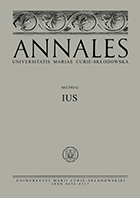Administrative Judiciary in the European Doctrine of Administrative Law at the Turn of the 19th and 20th Centuries
Administrative Judiciary in the European Doctrine of Administrative Law at the Turn of the 19th and 20th Centuries
Author(s): Grzegorz SmykSubject(s): History of Law, Public Administration, Public Law, Government/Political systems, 19th Century, Pre-WW I & WW I (1900 -1919)
Published by: Wydawnictwo Naukowe Uniwersytetu Marii Curie-Sklodowskiej
Keywords: public administration; administrative law; administrative judiciary;
Summary/Abstract: One of the fundamental assumptions of a constitutional and lawful state was recognizing the existence of an inviolable sphere of rights and freedom of individuals that restricted the freedom of administrative action. The guarantee for the protection of the sphere was seen in the statutory defining of the boundaries of the workings of the state apparatus and in the possibility of the external audit of the legality of the public administration. The duty was supposed to be fulfilled mainly by administrative judiciary which was considered to be one of the most significant institutions of administrative law in the 19th-century theory and practice. The term “administrative judiciary” was understood as the settlement of complaints against unlawful administrative decisions implemented by way of contentious proceeding before the authorities of the Member State. Such understanding of administrative judiciary did not decide upon the necessity for separating individual authorities, independent of Common Courts, that were established for administrative disputes resolution. It also did not define the material scope of its characteristics. Those issues were of special interest to the European Administrative Sciences, especially in the second half of the 19th century.
Journal: Annales Universitatis Mariae Curie-Skłodowska, sectio G – Ius
- Issue Year: 65/2018
- Issue No: 1
- Page Range: 141-154
- Page Count: 14
- Language: English

